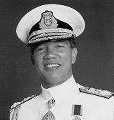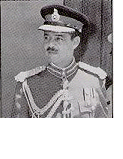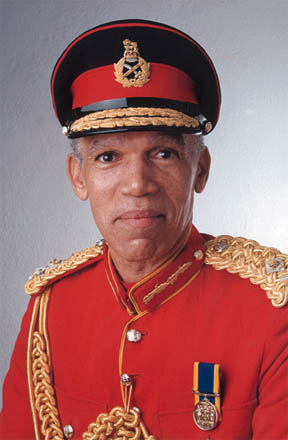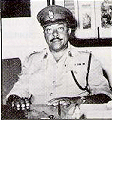|
|||||||||||||||||||||||||||||||
| Home > Info Centre > Publications > Alert 2000 > JDF and Constitutional Reform | |||||||||||||||||||||||||||||||
|
|
The JDF is an important institution and will no doubt continue – as it has up to now – to play a significant role in nationhood. It should therefore be properly included in any consideration on constitutional reform. However, one has first to be satisfied that Jamaica, a relatively poor developing country, really needs a defence force. An article of this nature should, therefore, first set out to determine the purpose of the JDF. It is only possible in an article of this nature to state that given that there will always be conflicts and that such conflicts will invariably lead to the need for the State to resolve the same by the use of force, the Military will always be required. If we accept that the JDF fits the given historically established necessity – the State’s instrument to apply force, to advance its legitimate interest or protect its existence – then one should accept that there is a clear need for the JDF. Existing foundation The Jamaica Defence Force is constituted under the provisions of Section 4 of the Defence Act. The Force as at present constituted is geared to perform the following functions: 1. To defend the country against external aggression 2. To aid the Civil power in the maintenance of law and order 3. To assist in the maintenance of essential services in times of emergency 4. To assist and protect the civilian population in the event of war or natural disaster 5. To provide military ceremonial 6. To give assistance to government departments and private organisations in such ad hoc ways as providing air, sea and land transport. The Defence Board by Section 9(1) of the Act ‘…shall, subject to the provisions of sub-section (2) be responsible under the general authority of the minister for the command, discipline and administration of all other matters relating to the JDF’. The members of the Defence Board are stipulated at Section 10, with the Prime Minister as chairman, a minister of government as a member; with the two other members being the Chief of Staff and the Permanent Secretary of the ministry responsible for defence. A study of the Jamaican Constitution shows that the JDF (as an institution), the Jamaica Defence Board and the post of Chief of Staff are not mentioned. The existing Jamaican Constitution however, does refer to a ‘military’ and seeks to separate the military from the ‘Public Service’ when in the Interpretation section, it defines the Public Service as ‘… the service of the Crown in a civil capacity’. A situation that is certainly acceptable and desirable and to be preserved under any new or revised constitution. Unlike most other constitutions, the Jamaican Constitution does not provide for a Commander-in-Chief for its military Force. It is interesting and worthy of note that the Jamaican Constitution provides for a Judicial Service Commission, a Public Service Commission and a Police Service Commission as bodies for the governance of these respective government entities, but the composition of the Jamaica Defence Board and functions, are not set out in the Constitution. Constitutional deficiencies The Defence Act also provides for the manner in which the Force may be employed and its operational command. There can be no doubt that these two areas are fundamental to the Force and, whereas to my knowledge, they have never been abused, they must be safeguarded for the future. As currently obtains, these two fundamental areas can be amended or repealed by a simple majority of Parliament. I believe that inclusion of an institution in the text of the Constitution should be based on the inherent and permanent value of that institution to the country, which value needs to be protected and preserved for use as and when necessary. It is my opinion that the JDF is one such institution. It is therefore interesting to note that the 1991 – 1994 Constitutional Reform Committee reported on the JDF as follows… "in discussions relating to the security forces, it was generally agreed that for troops to be sent abroad, Parliament should either approve or promptly affirm. With respect to the questions whether the Constitution should expressly and clearly set out the security forces to be created and maintained and restrict the authority of Parliament or the executive to create new or additional forces, the Commission was of the view that the Defence Act was a comprehensive statute". The Joint Select Committee of the Houses of Parliament on Constitutional and Electoral Reform recommended that certain institutions be ‘enshrined’ in the Constitution – but the JDF was not one of them.
It is my submission that in any revised Jamaican Constitution the following matters relative to the JDF be included: 1. If the JDF is to continue to enjoy the reputation of being impartial and non-partisan, then it must be governed by a body that can never be perceived or accused of being political. It is, important that civilian control in the form of a governing body be maintained. 2. The posts of Commander-in-Chief along with the Chief of Staff should be recognised and so recorded in the Constitution. 3. The employment of the JDF, and indication of who may authorise its employment overseas and locally should be stipulated. The JDF, as an institution, has possibly an enviable record of being respected by respective administrations since Independence. It has been and continues to be a loyal institution; and it has been and continues to be effective. Constitutional documents, I believe, are a means by which abuses are discouraged and rights preserved. It is therefore very important that a vital institution such as the JDF be seriously considered in the preparation of any new or revised constitution. It certainly is the duty of all Jamaicans to ensure that the awesome power of their Military can never be used to deprive them of their sacred rights and freedom and, equally, that it can be utilised to the maximum legitimate effect in the best interest of the nation.
|
||||||||||||||||||||||||||||||
|
|
|||||||||||||||||||||||||||||||







